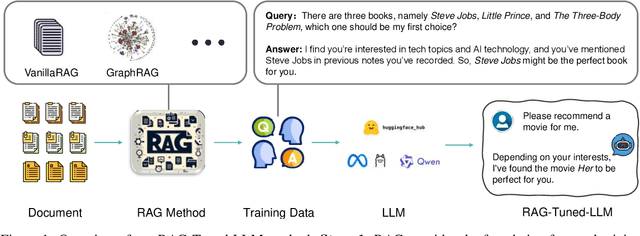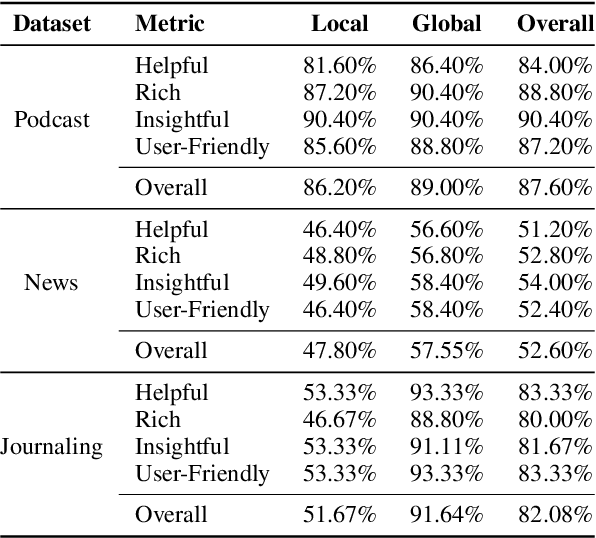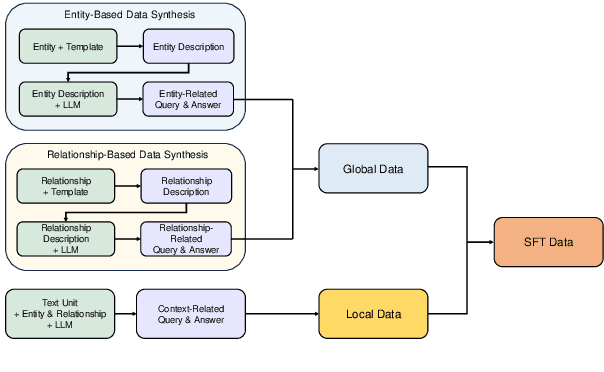Jiale Wei
MICA: Multi-Agent Industrial Coordination Assistant
Sep 17, 2025Abstract:Industrial workflows demand adaptive and trustworthy assistance that can operate under limited computing, connectivity, and strict privacy constraints. In this work, we present MICA (Multi-Agent Industrial Coordination Assistant), a perception-grounded and speech-interactive system that delivers real-time guidance for assembly, troubleshooting, part queries, and maintenance. MICA coordinates five role-specialized language agents, audited by a safety checker, to ensure accurate and compliant support. To achieve robust step understanding, we introduce Adaptive Step Fusion (ASF), which dynamically blends expert reasoning with online adaptation from natural speech feedback. Furthermore, we establish a new multi-agent coordination benchmark across representative task categories and propose evaluation metrics tailored to industrial assistance, enabling systematic comparison of different coordination topologies. Our experiments demonstrate that MICA consistently improves task success, reliability, and responsiveness over baseline structures, while remaining deployable on practical offline hardware. Together, these contributions highlight MICA as a step toward deployable, privacy-preserving multi-agent assistants for dynamic factory environments. The source code will be made publicly available at https://github.com/Kratos-Wen/MICA.
Hallucinating 360°: Panoramic Street-View Generation via Local Scenes Diffusion and Probabilistic Prompting
Jul 09, 2025



Abstract:Panoramic perception holds significant potential for autonomous driving, enabling vehicles to acquire a comprehensive 360{\deg} surround view in a single shot. However, autonomous driving is a data-driven task. Complete panoramic data acquisition requires complex sampling systems and annotation pipelines, which are time-consuming and labor-intensive. Although existing street view generation models have demonstrated strong data regeneration capabilities, they can only learn from the fixed data distribution of existing datasets and cannot achieve high-quality, controllable panoramic generation. In this paper, we propose the first panoramic generation method Percep360 for autonomous driving. Percep360 enables coherent generation of panoramic data with control signals based on the stitched panoramic data. Percep360 focuses on two key aspects: coherence and controllability. Specifically, to overcome the inherent information loss caused by the pinhole sampling process, we propose the Local Scenes Diffusion Method (LSDM). LSDM reformulates the panorama generation as a spatially continuous diffusion process, bridging the gaps between different data distributions. Additionally, to achieve the controllable generation of panoramic images, we propose a Probabilistic Prompting Method (PPM). PPM dynamically selects the most relevant control cues, enabling controllable panoramic image generation. We evaluate the effectiveness of the generated images from three perspectives: image quality assessment (i.e., no-reference and with reference), controllability, and their utility in real-world Bird's Eye View (BEV) segmentation. Notably, the generated data consistently outperforms the original stitched images in no-reference quality metrics and enhances downstream perception models. The source code will be publicly available at https://github.com/Bryant-Teng/Percep360.
Tuning LLMs by RAG Principles: Towards LLM-native Memory
Mar 20, 2025



Abstract:Memory, additional information beyond the training of large language models (LLMs), is crucial to various real-world applications, such as personal assistant. The two mainstream solutions to incorporate memory into the generation process are long-context LLMs and retrieval-augmented generation (RAG). In this paper, we first systematically compare these two types of solutions on three renovated/new datasets and show that (1) long-context solutions, although more expensive, shall be easier to capture the big picture and better answer queries which require considering the memory as a whole; and (2) when the queries concern specific information, RAG solutions shall be more competitive especially when the keywords can be explicitly matched. Therefore, we propose a novel method RAG-Tuned-LLM which fine-tunes a relative small (e.g., 7B) LLM using the data generated following the RAG principles, so it can combine the advantages of both solutions. Extensive experiments on three datasets demonstrate that RAG-Tuned-LLM can beat long-context LLMs and RAG methods across a wide range of query types.
AI-native Memory 2.0: Second Me
Mar 11, 2025Abstract:Human interaction with the external world fundamentally involves the exchange of personal memory, whether with other individuals, websites, applications, or, in the future, AI agents. A significant portion of this interaction is redundant, requiring users to repeatedly provide the same information across different contexts. Existing solutions, such as browser-stored credentials, autofill mechanisms, and unified authentication systems, have aimed to mitigate this redundancy by serving as intermediaries that store and retrieve commonly used user data. The advent of large language models (LLMs) presents an opportunity to redefine memory management through an AI-native paradigm: SECOND ME. SECOND ME acts as an intelligent, persistent memory offload system that retains, organizes, and dynamically utilizes user-specific knowledge. By serving as an intermediary in user interactions, it can autonomously generate context-aware responses, prefill required information, and facilitate seamless communication with external systems, significantly reducing cognitive load and interaction friction. Unlike traditional memory storage solutions, SECOND ME extends beyond static data retention by leveraging LLM-based memory parameterization. This enables structured organization, contextual reasoning, and adaptive knowledge retrieval, facilitating a more systematic and intelligent approach to memory management. As AI-driven personal agents like SECOND ME become increasingly integrated into digital ecosystems, SECOND ME further represents a critical step toward augmenting human-world interaction with persistent, contextually aware, and self-optimizing memory systems. We have open-sourced the fully localizable deployment system at GitHub: https://github.com/Mindverse/Second-Me.
Deformable Mamba for Wide Field of View Segmentation
Nov 25, 2024



Abstract:Wide-FoV cameras, like fisheye and panoramic setups, are essential for broader perception but introduce significant distortions in 180{\deg} and 360{\deg} images, complicating dense prediction tasks. For instance, existing MAMBA models lacking distortion-aware capacity cannot perform well in panoramic semantic segmentation. To address this problem, this work presents Deformable Mamba, a unified framework specifically designed to address imaging distortions within the context of panoramic and fisheye semantic segmentation. At the core is a decoder constructed with a series of Deformable Mamba Fusion (DMF) blocks, making the whole framework more deformable, efficient, and accurate, when handling extreme distortions. Extensive evaluations across five datasets demonstrate that our method consistently improves segmentation accuracy compared to the previous state-of-the-art methods tailored for specific FoVs. Notably, Deformable Mamba achieves a +2.5% performance improvement on the 360{\deg} Stanford2D3D dataset, and shows better results across FoVs from 60{\deg} to 360{\deg}.
OneBEV: Using One Panoramic Image for Bird's-Eye-View Semantic Mapping
Sep 20, 2024Abstract:In the field of autonomous driving, Bird's-Eye-View (BEV) perception has attracted increasing attention in the community since it provides more comprehensive information compared with pinhole front-view images and panoramas. Traditional BEV methods, which rely on multiple narrow-field cameras and complex pose estimations, often face calibration and synchronization issues. To break the wall of the aforementioned challenges, in this work, we introduce OneBEV, a novel BEV semantic mapping approach using merely a single panoramic image as input, simplifying the mapping process and reducing computational complexities. A distortion-aware module termed Mamba View Transformation (MVT) is specifically designed to handle the spatial distortions in panoramas, transforming front-view features into BEV features without leveraging traditional attention mechanisms. Apart from the efficient framework, we contribute two datasets, i.e., nuScenes-360 and DeepAccident-360, tailored for the OneBEV task. Experimental results showcase that OneBEV achieves state-of-the-art performance with 51.1% and 36.1% mIoU on nuScenes-360 and DeepAccident-360, respectively. This work advances BEV semantic mapping in autonomous driving, paving the way for more advanced and reliable autonomous systems.
Reprint: a randomized extrapolation based on principal components for data augmentation
Apr 26, 2022



Abstract:Data scarcity and data imbalance have attracted a lot of attention in many fields. Data augmentation, explored as an effective approach to tackle them, can improve the robustness and efficiency of classification models by generating new samples. This paper presents REPRINT, a simple and effective hidden-space data augmentation method for imbalanced data classification. Given hidden-space representations of samples in each class, REPRINT extrapolates, in a randomized fashion, augmented examples for target class by using subspaces spanned by principal components to summarize distribution structure of both source and target class. Consequently, the examples generated would diversify the target while maintaining the original geometry of target distribution. Besides, this method involves a label refinement component which allows to synthesize new soft labels for augmented examples. Compared with different NLP data augmentation approaches under a range of data imbalanced scenarios on four text classification benchmark, REPRINT shows prominent improvements. Moreover, through comprehensive ablation studies, we show that label refinement is better than label-preserving for augmented examples, and that our method suggests stable and consistent improvements in terms of suitable choices of principal components. Moreover, REPRINT is appealing for its easy-to-use since it contains only one hyperparameter determining the dimension of subspace and requires low computational resource.
 Add to Chrome
Add to Chrome Add to Firefox
Add to Firefox Add to Edge
Add to Edge